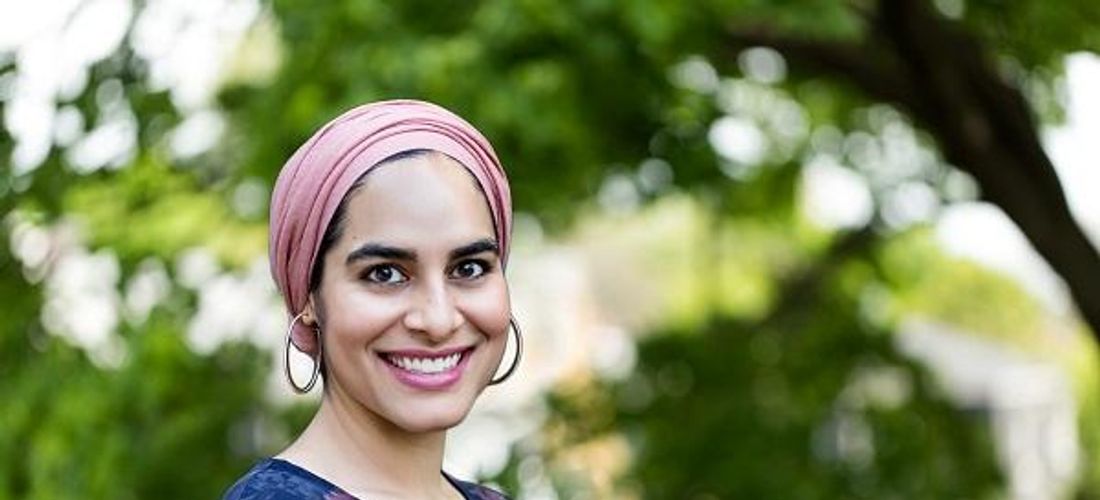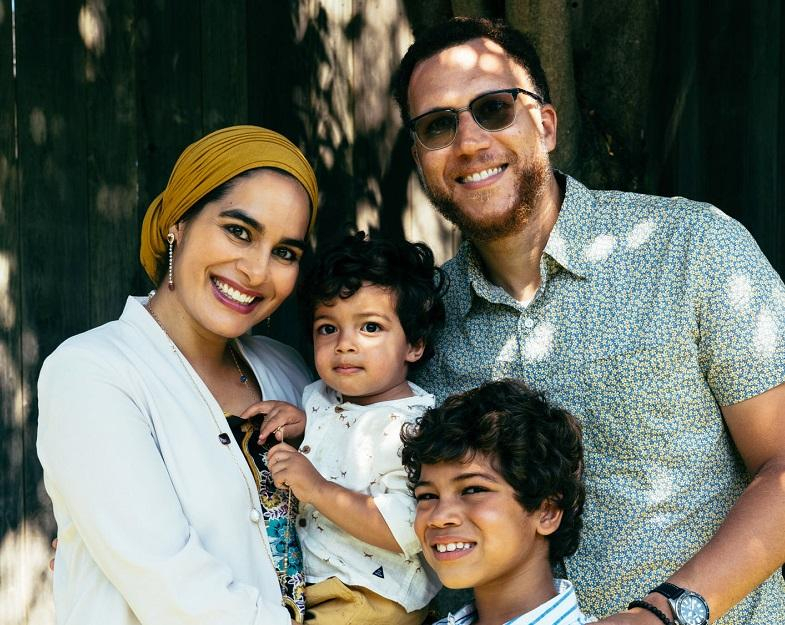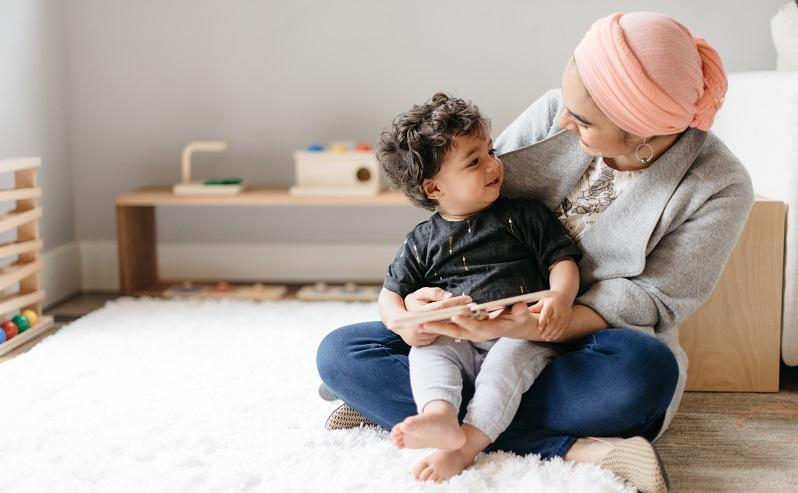Making Montessori Accessible to All Kids – an Interview with Entrepreneur Zahra Kassam
Community
|
Dec 9, 2019
|
9 MIN READ

If you're an fan of the hit show, Shark Tank, chances are you've seen Zahra Kassam pitch her Montessori company, Monti Kids to investors, ultimately striking a deal with Kevin O'Leary (aka Mr. Wonderful). Since then, she's demonstrated just how far a woman can go if she believes in herself and in her mission – most recently LEGO invested in her company.
Zahra is a Harvard grad and an internationally certified Montessori teacher for kids from birth to age six. She lives in California's Bay Area with her husband and two young sons, Musa and Zayd.
Her company, Monti Kids, provides a Montessori-based toy subscription, as well as support to parents to help their babies development. I first met Zahra at one of our Changemakers events in California and instantly fell in love with her warmth and kindness. I recently interviewed her about her entrepreneurial and motherhood journey, and why she's so passionate about making Montessori accessible to parents everywhere.

Zahra Kassam, wearing our Premium Jersey Hijab in Honey Gold.
It's amazing to see Muslim women entrepreneurs out there succeeding and doing big things! What inspired your idea to start Monti Kids?
I wanted to be a teacher since I was 10 years old. I was super focused on it. In undergrad, I studied psychology and did my masters in the Harvard Education school, then got my Montessori certification.
After graduating, I taught preschool, but things changed when I had my firstborn, Musa. Given my background, I was so excited to give my baby the best education from birth. But when he came I was overwhelmed by the basics of being a mom and [was] falling behind on his development and stressed out. While I was on maternity leave from preschool I was teaching mommy and me classes and noticed that the parents were all anxious too. We know how important these early years are, and we've heard the research – but what are we supposed to be doing?
I had this aha moment when I learned that birth to 3 is the most critical time for children's development. During these years the kids are not in school, and parents don't necessarily know what they should be doing with their babies. To me, the solution was simple. I was trained in Montessori and truly believe it's a genius curriculum. Many schools have been using this for hundreds of years, and it's worked. And, it's been proven around the world.
So, I wanted to make it accessible for parents via toys and videos and guides to guide parents through this period of development. Our customers have the support where they can ask an expert anything at any time. Simply, I want to give kids the best education and parents the best support.
Part of my mission is to spread awareness of how important this early period is for child development. There's never been a baby education brand to do this. I actually gave a TED talk a couple of weeks ago on it.
How did you go from concept to execution?
It was one step at a time. I started planing out what the product would look like. My guiding star was that I want to deliver the best education for babies and the best support for parents. Then I needed someone to make it. I didn't know about how to go about this – I was a preschool teacher before this. It was a lot of learning by doing, which is really how Montessori is. I started looking for manufacturers, then I needed to raise money to get that done. I met my first investor at a beautiful event where the Dalai Lama was speaking about educating the heart from birth to five.
My fundraising was one step at a time as was building the team. Finding the right people was a big step forward because it multiplied what we could get done in a day.
I had the idea when Musa turned one. I started working on it, and we incorporated five years ago and started hiring people, so he's grown up with my company.
What was it like to pitch to investors (Shark Tank, LEGO and beyond)? How did you know you were ready?
Well, it's definitely not easy to get people to give you money. Most people they see don't look like me, a woman of color wearing hijab and pregnant. Investors were not expecting to see that. Five years ago when I talked about education for babies to investors, they'd never heard of anyone trying to do this. It required a lot of confidence, and I spent a lot of time preparing my thoughts. Shark Tank was intense; I was so nervous before it because it meant putting myself out there for the whole world to see.
With LEGO it's different because they really believe in hands on learning for children, so they got it right away and could see that it's an amazing product and that business is doing well. With other investors, I'm doing a lot of explaining why we do what we do and showing them how successful it's been and what an opportunity it will be going forward.
I make sure that I know every question they will ask, I predict, I write it down and the answers. I have advisers who I practice with, and I make sure that I do things that make me feel confident. I dance as my workout, and it makes me feel really confident and grounded and the best version of myself. So, I sometimes dance before I meet with an investor so I go in feeling ready. Sometimes I'll actually go into the bathroom at the office and dance to a Beyonce song in the bathroom!
I also work with a nonprofit called Allraise (developed during the #MeToo movement), which is founded by some of the top women in Venture Capital. There are so few women that get backed by VC's and so few women writing checks, so this was a way to get more women into the industry. I'm on the founder side, where I help women raise their seed round (first round of funding for their company).

Zahra Kassam and her youngest son.
How does Montessori inspire you as a CEO of the company? Are there any aspects of it that translate into your own work model?
Yes, definitely. The goal of Montessori is to help children figure out what their natural gifts are and what they're good at and fired up about. Then helping them find their own path in life and school and career that is really fulfilling to them and allows them to be the best version of themselves and make their best contribution to society, whatever it is. I think a lot about that while managing my team.
I want that for each of them and want them to feel filled up by what they do and that they're using their talents and gifts and growing and learning. That's a really important part of our hiring. We're a mission-driven company, and everyone who works here is passionate about children and their families. And so we want to make sure we're supporting them on their unique path of development, and I try to do that with myself to as the CEO.
I read that diversity is very important to you as a founder. I love that – why is that so?
It's important for a few reasons. There's so much research that says diverse teams do better. When we're tackling any decision or problems, we get better ideas from diversity of thought. Different background = different ways of thinking. And its just a more fun and better way to live and get to know people.
We think a lot about it in our hiring process and in building the team.
What's your favorite thing about being an entrepreneur? Hardest part?
My favorite thing is the impact I get to make. We get emails all the time from families saying we've really made a difference in their lives, that we've helped them be better parents and that their children are doing things they never imagined. Our families really get a lot of value, and that's really the best part for me.
The worst part – having a startup can be very consuming and can take over your life, if you're not careful, and I've gone through periods where I've let that happen. There are times when I don't work out, see friends, take care of myself or my relationship, etc. because I'm so consumed by work. It's important to have boundaries and remember that it's not the only thing that defines me, especially as a founder. A startup can really become your identity, and separating it from my identity and realizing I'm much more than that (I'm a mom, a Muslim, wife, daughter, etc.) and giving those things my attention as well is important.
What are three (or more) lessons you've learned throughout your journey.
1. Taking care of myself first is one of the most important things I can do. If I just prioritize work and kids, I start to not feel well and then not do well, and it's not good for anybody. So, taking care of yourself is a lesson that I've learned the hard way through my startup journey. It's a marathon, and when you're in the startup world everything feels so urgent. I used to skip so many things I was invited to, like my friend's wedding, because I felt like I can't take the time off right now. But in hindsight, I should've gone to those things. This is a marathon, not a sprint.
2. Business is all about people. Going from preschool teacher to businesswoman, I've learned a lot about business, and I've realized that it's all about people. No matter how good your idea or product is, if you have good people on the team, that's what matters. Take care of your people in a holistic way. They have their own families and homes and struggles. Make sure they take care of themselves, and your care of them is [also] important.
3. I used to think there were all these rules I had to learn of how to start and grow a good business, and I realized a lot of the rules were made along time ago by people who don't look like me and aren't helpful. I can do things differently, like bringing my kids to work sometimes or getting close to your team members and bringing love into the workplace. I used to talk about love with my team and putting love into the product and for each other, but there's no rule book. It's up to us to write our own rules.
Any other advice for Muslim women entrepreneurs?
The advice I give anyone who wants to become an entrepreneur is to pick something to work on that you're really passionate about. It's a hard road, and there will be times that things aren't going well. What will get you through those hard times is knowing that you're doing meaningful work and making a difference. It makes it all worth it.
The other thing is to surround yourself with good advisers, and don't feel that you have to put together a strong front when talking to them. Allow yourself to be vulnerable; that's when you get the real help you need. The earlier you can do that, the better.
View this post on Instagram🎈This month, my younger son Zayd turned 2 and it brought up some sadness when I thought about how quickly he’s growing, and how I’m missing out on so much because of my busy work schedule. 💁♀️💼🏡Whether you work outside the home or not, mom guilt is real and it shows up too often. I’m actively fighting off mom guilt these days, reminding myself that it’s based on unrealistic standards of motherhood and ignores the fact that we are not designed to raise children without a fully stacked support system. So along with celebrating Zayd by throwing a party, I celebrated myself by writing a list of 24 reasons that I’m a great mother (one for every month of his life). 📝 ❤️ 💆♀️Every time my mom guilt kicks up, I’m going to kick it right back down by appreciating myself and writing another list if that’s what it takes. ✨As a community, I hope we can remind each other not only to cut ourselves some slack but to go beyond that and really celebrate ourselves as mothers. Maybe if we make that a habit starting with ourselves, we can slowly shift the surrounding culture of unrealistic expectations into a culture of celebrating moms and motherhood - just as it should be. #Parenting #Family #FamilyIsEverything #Momprenuer #MomBoss #CEO #FemaleFounder #Entrepreneur #MomLife #GrowthMindset #Grateful #Gratitude #Inspire #Inspiration #Growth #Journey #Love #MotherhoodUnplugged #MomsofInstagram #LessonsLearned #LifeLessons #BePresent #MomentsLikeThis #Montessori #MontessoriFromBirth #MomTruthsA post shared by Zahra Kassam @ Monti Kids (@zahraikassam) on Nov 29, 2019 at 8:55am PST
You built Montikids while building your own family, Masha'Allah . I can't imagine it's been an easy journey. I've seen you post about mom guilt and putting unnecessary pressures on ourselves as women and mothers. What has this journey looked like for you?
I think about this a lot. A lot of women have ideas for businesses after they become mothers. Women become more creative after they become mothers. But, it's a challenge that we have if we want to do both. I was fundraising as my second was born. I delivered him at midnight and at 4 a.m. I was sending investor emails from my hospital bed. I had really bad postpartum depression, and I was crying a lot. My biggest learning is to be really gentle with myself.
We have this belief that we can do everything – and I think we can be amazing mothers and really impactful business/career women. My question is, do we want to? Is it necessary? Is it what's best for us? Maybe we do both, but we don't have impeccably high standards in every area. I try to be conscious about my choices and what I devote my time to. Maybe I don't make food every day, but I get home and have my nanny cook for us. Or [maybe I] pick up food and spend time with them. It's a lot of writing my own rules for how this looks.
My path is going to look very different from all the mothers who came before us and all the business people who came before us. It's better for us and for everyone to write these rules [for ourselves] – better for the kids, the business, the customers.
I learned that I can be a different kind of mom through postpartum depression. But only just recently I learned that I can be a different kind of CEO.
You can follow Zahra's journey on Instagram, and get endless inspo for your babies on the Monti Kids page.
Subscribe to be the first to know about new product releases, styling ideas and more.
What products are you interested in?

